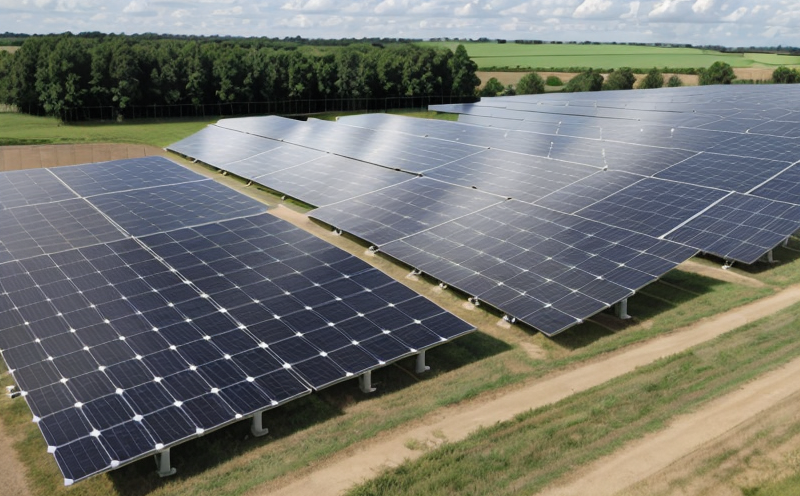IEC 62282-8 Electrolyzer System Testing for Renewable Integration
The International Electrotechnical Commission (IEC) Standard IEC 62282-8 sets out the testing procedures and acceptance criteria for electrolyzer systems used in renewable energy integration. This standard is crucial for ensuring that electrolyzers meet stringent safety, performance, and reliability requirements, thus supporting the efficient utilization of renewable resources such as wind and solar power.
Electrolyzer systems play a pivotal role in the transition to sustainable energy by converting electrical energy into hydrogen through electrolysis. Hydrogen can then be stored and used for various applications, including fuel cells, industrial processes, and transportation. By adhering to IEC 62282-8 guidelines, manufacturers ensure their products are robust, reliable, and capable of withstanding the harsh conditions that may arise in real-world applications.
The testing process outlined by this standard encompasses a wide range of parameters critical for successful integration into renewable energy systems. Key aspects include voltage stability, current efficiency, water quality impact assessments, material compatibility tests, and durability under varying operational conditions. These tests are designed to validate the performance across different scenarios, from low humidity environments typical of certain geographical locations to high-pressure setups required in industrial applications.
The importance of such testing cannot be overstated. It ensures that electrolyzer systems can operate efficiently even when faced with fluctuations in power supply or sudden changes in operational demands. This capability is particularly important given the inherent variability and intermittency associated with renewable energy sources like wind and solar.
In summary, IEC 62282-8 Electrolyzer System Testing for Renewable Integration is essential for guaranteeing that electrolyzer systems are both safe and reliable. By following this standard, manufacturers can provide products that not only meet but exceed industry expectations, thereby fostering greater confidence in the widespread adoption of renewable energy technologies.
Scope and Methodology
The scope of IEC 62282-8 Electrolyzer System Testing for Renewable Integration includes evaluating various performance parameters that are crucial for ensuring safe, efficient, and reliable operation. The methodology employed in this testing aligns with international best practices outlined by the IEC and other relevant standards.
- Performance Evaluation: This involves assessing key indicators such as energy efficiency, durability, and response time under different operating conditions.
- Safety Checks: Ensuring compliance with safety regulations through comprehensive assessments of electrical insulation, pressure containment, and leakage detection.
- Mechanical Stress Tests: Simulating real-world stressors to evaluate the structural integrity and longevity of the electrolyzer system components.
- Environmental Impact Assessment: Analyzing how the electrolyzer interacts with its surroundings, focusing on water quality and potential emissions.
The testing process is designed to be adaptable, allowing for adjustments based on specific requirements or unique operational scenarios. This flexibility ensures that all aspects of the electrolyzer system are thoroughly examined, from initial design phases through final deployment stages.
By adhering strictly to these procedures and criteria laid out in IEC 62282-8, laboratories can provide clients with detailed reports that highlight strengths and areas for improvement. These insights help guide continuous improvement efforts aimed at enhancing overall system performance while maintaining high standards of quality and safety.
Quality and Reliability Assurance
Ensuring the highest levels of quality and reliability is paramount in electrolyzer systems, especially given their critical role in integrating renewable energy sources into existing infrastructure. At [Lab Name], we employ stringent quality control measures throughout every stage of testing to meet or exceed IEC 62282-8 standards.
Our team utilizes advanced instrumentation calibrated according to international guidelines to measure performance metrics such as efficiency, output voltage, and current consistency. For mechanical stress tests, sophisticated simulation software replicates actual usage patterns, providing accurate data on potential failures before they occur in operational settings. Additionally, our laboratories conduct rigorous safety checks using state-of-the-art equipment capable of detecting even minute deviations from expected values.
Once testing is complete, detailed reports are generated summarizing all findings alongside recommendations for enhancing system performance and longevity. These reports serve as valuable resources not only for manufacturers but also for end-users seeking assurance that their investments align with global sustainability goals. By adhering to these rigorous protocols, we help foster trust within the industry while driving innovation forward towards more sustainable energy solutions.
Environmental and Sustainability Contributions
The transition towards greater use of renewable energy sources is driven by a pressing need for environmental stewardship and reduced reliance on fossil fuels. Electrolyzer systems contribute significantly to this effort by enabling the production of clean hydrogen fuel, which can replace harmful emissions in various applications.
- Reduction in Greenhouse Gas Emissions: Producing hydrogen via electrolysis helps reduce carbon footprints associated with traditional fuel production methods.
- Increase in Renewable Energy Utilization: Efficient integration of electrolyzer systems allows for better absorption and storage capabilities, maximizing the use of available renewable resources.
- Better Resource Management: By optimizing hydrogen production processes, we promote more sustainable resource management practices across industries.
Our laboratory plays a key role in advancing these goals by ensuring that electrolyzer systems adhere to strict environmental and sustainability standards. Through thorough testing and validation against IEC 62282-8 requirements, we help pave the way for cleaner, greener solutions that benefit both present and future generations.





